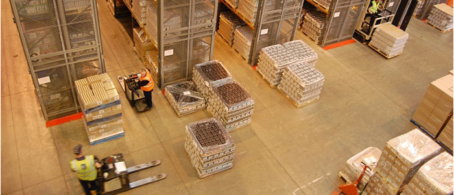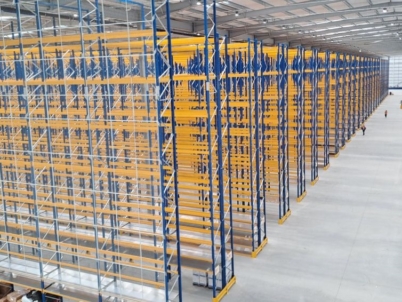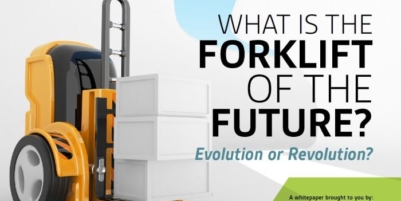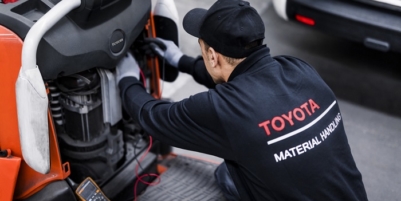-
Nutrivend selects Forterro’s Orderwise to support online expansion and streamline operations - April 11, 2025
-
ARROWXL LAUNCHES AMBITIOUS ZERO WASTE ROADMAP - April 8, 2025
-
THE BCMPA’S NEW CAMPAIGN DRIVES OUTSOURCING SUCCESS IN Q1 - April 7, 2025
-
BLACKOUT TECHNOLOGIES TARGETS TELEMATICS-INTEGRATED MOBILE DEVICE BLOCKING TO COMBAT SMARTPHONE DISTRACTION - April 1, 2025
-
Sparck Technologies awarded Royal designation - March 27, 2025
-
OpenADR Alliance announces first OpenADR 3.0 certified products with EVoke Systems, E.ON Energy and Universal Devices - March 25, 2025
-
Growing fulfilment and contract packer appoints new Managing Director - March 25, 2025
-
When is it time to invest in a WMS? Understanding the key trigger points - March 25, 2025
-
eCapital helps Vantage Recruitment on its journey to financial success - March 24, 2025
-
Hugo Beck Celebrates 70 Years of Packaging Innovation with Open House Events - March 20, 2025
Logistics operations using ATEX lift trucks in Zone 2 should be using active gas detection to improve safety and protect people, warns Pyroban.
“In Zone 2 it is important that drivers know when a potentially explosive atmosphere is present so that the cause of the flammable atmosphere can be investigated and rectified,” says Darren Boiling, Technical Support Manager, from explosion protection safety company Pyroban. “Active gas detection systems on lift trucks can play a vital role in this, significantly improving onsite safety.”
“However, some 3PLs have been slow to adopt this active approach assuming that it is better to operate ATEX lift trucks that use passive, Ex d protection methods so that trucks can work through a gas or vapour release,” he continues.
In Zone 1 this passive approach can be effective because the gas or vapour is expected. However, in Zone 2 hazardous areas it is not usually expected unless there is an accidental spillage or release. This means it could be dangerous for drivers, the operation and stability of the supply chain. Active gas detection ensures that drivers know there is a problem and can act upon it accordingly.
“Even if your logistics operation is storing, handling or transporting gas or chemicals, not everywhere will automatically be designated Zone 1,” says Darren. “It’s the activities within the operation that dictate the Zone, not the type of product handled. For safety, its vital to have your trucks converted for the correct Zone.”
Pyroban’s most popular active gas detection solution for Zone 2 areas is system6000™ which involves converting the truck at the Pyroban factory in the UK in as little as six weeks. system6000 combines gas detection with various explosion protection methods and is suitable for all types of diesel and electric materials handling equipment working in logistics operations, such as VNA, pallet, picking, counterbalance and reach trucks, and more.
“Many businesses wrongly believe that trucks with active gas detection ‘stop all the time’, so a passive protection solution is better value as it drives productivity,” says Darren. “In fact, a truck will only stop if the level of gas detected in the Zone 2 area indicates a very serious issue that the truck, and employees, should absolutely not be operating in.”
With system6000, the driver gets visual/audible warnings if gas or vapour is detected at 10% LEL (propane in air) prompting them to drive away from the area and raise an alert for investigation and clean up. If the gas or vapour levels rise to 25% LEL the truck will automatically be brought to a controlled stop preventing any potential explosions.
“The cost of owning an explosion proof truck actually drops considerably with an active conversion such as system6000,” he says. “The conversion is less expensive and faster, putting the truck into action sooner. For large fleets, the cost savings can be substantial.”
The system6000 active conversion can be implemented on most brands and types of materials handling equipment and compared to a Zone 1 conversion, it maintains more of the original truck’s features and performance. It is easier to maintain with fewer bespoke parts.
“With the benefit of easier maintenance, and with Pyroban service and support, we help logistics operations worldwide to maximise uptime and reduce the total cost of operation,” says Darren. “We have supported many businesses in managing the smooth transition from a passive, to an active system.”
For those Zone 2 operations where gas detection is not suitable, Pyroban does offer passive solutions Ex-tec 3G for electric vehicles and Euromech 3G for diesel vehicles. Pyroban also carries out 2G conversions for Zone 1 hazardous areas.
Whether an application chooses an active or passive system, all Pyroban products are certified to ATEX 2014/34/EU following standard EN1755, and in accordance with ISO3691 as well as other local safety legislation.
Pyroban has been at the forefront of explosion protection solutions for materials handling equipment for more than 50 years, developing solutions to protect people, equipment, sites and a brands’ reputation.
On stand B38 in Hall 9 at the forthcoming LogiMAT event, Pyroban will be giving attendees the chance to learn more about the benefits of active gas detection and see system6000 in action. Visit the show Tuesday 10th March to Thursday 12th March at the Stuttgart Trade Fair Centre, Germany.
Are you active?
Find out more at www.pyroban.com. Or contact Pyroban – call +44 1273 456825 or email [email protected].
































